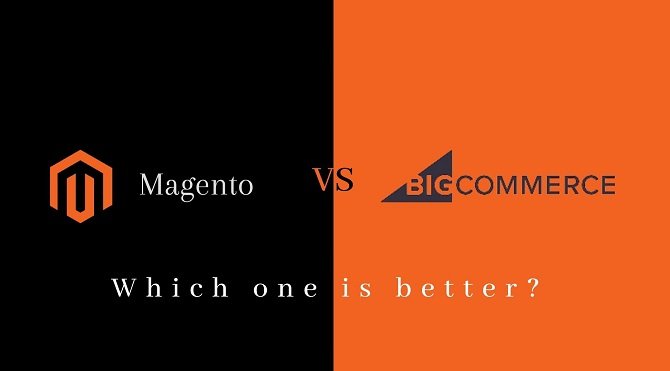Magento vs BigCommerce: Which One is Better?
- 1 Magento vs BigCommerce: Which One is Better?
- 1.1 Hosting
- 1.2 Scalability
- 1.3 SEO & Marketing
- 1.4 Security
- 1.5 Speed & Performance
- 1.6 Pricing
- 1.7 Support
- 1.8 Ease Of Use
- 1.9 Wholesale Capabilities
Are you unsure which eCommerce platform is right for your company? Selling on the internet is a tough business. Developing a website does not guarantee that customers will flock to it. Instead, you should use your eCommerce platform to give your clients the buying experience they want. Your technology should also make it easier to run your firm.
Magento vs BigCommerce: Which One is Better?
It’s a difficult decision to make with so much information available. But don’t worry…we’re here to assist you.
-
Hosting
Because BigCommerce is a Google Cloud-hosted platform, you won’t have to worry about finding the correct BigCommerce hosting provider. BigCommerce has an average uptime of more than 99.99 percent, which is similar to downtime. With BigCommerce hosting, your website will load faster and you will spend less time maintaining it.
Magento can be installed on-site, in the cloud, or by a third party. Your website is entirely hosted and managed by Magento when you use Magento Commerce Cloud. You must purchase your name and host if you choose Magento Open Source.
-
Scalability
Scalability is critical for firms that intend to grow in the future. This is due to the fact that dealing with a big amount of traffic and transactions is not straightforward and necessitates planning. Magento is the most scalable platform, making it an excellent choice for large-scale online retailers. A robust inventory management system enables a smooth scale-up of catalogs and products in stores. However, for you to completely take advantage of the abilities of Magento, you’ll probably require to hire Magento developers who have broad expertise in developing ideal online stores.
Unlike BigCommerce, Magento can process more orders per hour on the same hardware and handle order volume strikes efficiently, resulting in near-instant catalog browsing service response times.
-
SEO & Marketing
Magento: Magento is a popular eCommerce platform that has a number of useful SEO options that assist businesses to improve their search engine presence.
Merchants can incorporate a variety of third-party modules into their stores for more advanced functionality.
BigCommerce: In terms of SEO, in addition to basic SEO settings, BigCommerce offers more advanced capabilities such as Microdata (Rich Snippets), which improves the appearance of websites on search engines by making them more informative, robots.txt, and Google sitemap.
BigCommerce also gives merchants access to a program called Support SocialShop, which lets them promote their products on social media sites like Facebook, Pinterest, and Twitter. BigCommerce, on the other hand, is completely outclassed by Magento, which offers an extensive range of marketing capabilities.
-
Security
Magento is always on top of its game when it comes to security, with several security fixes released on a regular basis. Each patch is designed to address vulnerabilities and eliminate potential hazards associated with previous versions, ensuring the security of eCommerce websites. As a result, it’s critical to keep the store’s patch up to date.
In this regard, BigCommerce is not inferior. The platform includes hosting and a domain name, as well as enterprise-level security. It’s also PCI and ISO/IEC 27001 compliant, guaranteeing that all financial transactions are secure.
-
Speed & Performance
BigCommerce cannot be adjusted for speed optimization because it is a hosted eCommerce system. In the long run, this restriction may be inconvenient. Magento, on the other hand, has a reputation for scalability and performance. Because it’s a self-hosted platform, store owners have complete control over the server they use and may make any necessary adjustments to boost performance metrics. This entails combining managed Magento hosting with modern technologies such as a caching mechanism and a content delivery network (CDN).
-
Pricing
Because money is the lifeblood of businesses, one of the most important considerations when partnering with an eCommerce platform is cost. Magento Community Edition is, as previously stated, completely free.
This implies that its source code is available for free download, but it still provides merchants with all of the essential features of an online store. Developers can also make it configurable to meet the demands of retailers.
-
Support
Magento has a larger network of consumers, developers, and Magento partners when it comes to the need for assistance. Because of its popularity, businesses who use this platform can easily get community or official help. BigCommerce users, like Magento users, can use BigCommerce to search for discussions on specific topics. BigCommerce, being a premium platform, also provides 24/7 official assistance by phone, email, or live chat with support experts who are well-versed in the platform.
-
Ease Of Use
Magento is not a platform for beginners because modification necessitates coding knowledge and experience. This work may be difficult for you if you are not a coder. However, for enterprise-level enterprises with high sales and overworked administrators, this isn’t so awful.
BigCommerce, on the other hand, is considerably easier to use for beginners than Magento because it does not require any coding skills. Another advantage of Bigcommerce is that it has keyboard shortcuts, which can save you a lot of time and effort when managing your store from the backend.
-
Wholesale Capabilities
Compared to BigCommerce, Magento gives you more flexibility when it comes to adding functionality if you have a committed development staff prepared to make the necessary changes. The Magento 2 platform can handle massive catalogs, making it ideal for medium and big businesses.
For a reason, BigCommerce and Magento are two of the most popular eCommerce platforms.
Between the two, there’s a lot to compare. At the end of the day, it all boils down to your specific business requirements, budget, and expansion ambitions. If it’s the correct fit, either platform will get you there. We recommend getting assistance from software development companies to achieve the best result.

















